May 26, 2021
The field has narrowed in Iran's highly-anticipated presidential elections set for next month. The powerful Guardian Council has given a handful of candidates the go-ahead to compete for the presidency. But critics of the regime say it's barely a competition at all. What's happened so far, and what does this tell us about the state of Iran's domestic politics?
The process. Iran's electoral process is tightly controlled by Supreme Leader Ayatollah Ali Khamenei, who has been in power since 1989 and calls all the shots in Iran. (Though Iran's president is head of the executive branch, he still answers directly to the supreme leader, who has the final say on foreign and domestic policy.)
The Guardian Council — made up of 12 appointees, half of whom are clerics handpicked by Khamenei himself, while the other six are judges or lawyers tapped by the head of Iran's judiciary — ultimately decides who can run for president. Of the 592 Iranians who put their hats in the ring this cycle, the Guardian Council narrowed the list down to just seven.
Analysts say this list is the least ideologically diverse in history. Most of those on the ballot are deemed "hardliners" — a faction that asserts Islamic law over personal freedom inside Iran and opposes engagement with the West.
"Raisi vs Raisi." Since former parliamentary speaker Ali Larijani — a candidate with significant name recognition — didn't make the cut, it's all but certain that Ebraim Raisi, a conservative cleric and the country's top judge, will secure the presidency. (Since 2019, Raisi has led the judiciary that selects Guardian Council members who… select presidential candidates.)
For months, the supreme leader and relevant government institutions have been tacitly pushing Raisi's candidacy, leading observers to muse that the race can be summed up as "Raisi vs Raisi." The other candidates are no-hopers, they say, several of whom have run for the presidency in previous years and barely made an electoral dent.
There are several discernible takeaways from the Iranian leadership's brazen attempt to fix the outcome of the race.
Risk vs reward. It's clear that Khamenei wants to remove any hurdles that could stand in the way of Raisi clinching the job. Many say that's because Raisi — an uncompromising hardliner who, as Deputy Tehran prosecutor in the 1980s, signed off on the execution of thousands of political prisoners after the Iran-Iraq War — is being groomed to replace the all-powerful supreme leader.
Raisi already lost one presidential race in 2017, and losing a second time would undermine Khamenei's attempt to market him as a successor with popular appeal. With the stakes this high (after all, Khamenei is 82) that's not a risk the supreme leader seems willing to take.
But the strategy could backfire. Disillusionment with a perceived rigged election is likely to depress voter turnout. Low participation would be extremely embarrassing for Khamenei, whose regime's domestic credibility has suffered significantly in recent years amid a spiraling economic downturn imposed by crippling US sanctions. Popular boycott of the election would give hardliners full control of government but little mandate to govern.
And from the regime's perspective, the only thing worse than voter apathy is voter anger. Iranians have a tradition of mass mobilizations to express discontent with economic stagnation and lack of political representation. (After a disputed election in 2009, for example, the Green Movement took the streets in massive numbers, posing the biggest threat to the regime since the 1979 Islamic Revolution.) This sort of upheaval would be disastrous for Khamenei and his cronies — and even Raisi has called for more candidates to be allowed to run, saying he hoped this year's race would be more "competitive and participatory."
Nuclear deal in limbo. Less clear, however, is how this all might affect the recently-resumed talks in Vienna with six world powers. It surely doesn't make them any easier. The Biden administration, for its part, says that it will only lift economic sanctions if Iran stops enriching uranium in compliance with the accord, but hardliners say that after former president Trump abandoned the deal in 2018, Washington can't be trusted. Indeed, reviving the deal will be harder if Iran's current President Hassan Rouhani is replaced with an ideologically intransigent hardliner who campaigns actively against compromise.
What can we expect now? A Raisi triumph. But as Ahmad Zeidabadi, an Iranian journalist and former political prisoner told the Financial Times:"A victory of Raisi after the elimination of his rivals would be nothing but winning a running race with turtles."
More For You
Microsoft unveiled a new set of commitments guiding its community‑first approach to AI infrastructure development. The strategy focuses on energy affordability, water efficiency, job creation, local investment, and AI‑driven skilling. As demand for digital infrastructure accelerates, the company is pushing a new model for responsible datacenter growth — one built on sustainability, economic mobility, and long‑term partnership with the communities that host it. The move signals how AI infrastructure is reshaping local economies and what people expect from the tech shaping their future. Read the full blog here.
Most Popular
- YouTube
On GZERO World, Finnish President Alexander Stubb says that Ukraine and its NATO allies are aligned on a path to a ceasefire but warns that Vladimir Putin will drag out the war, not because he thinks he’ll win… but because he knows he’ll lose.
- YouTube
At the 2026 World Economic Forum in Davos, GZERO’s Tony Maciulis spoke with Ariel Ekblaw, Founder of the Aurelia Institute, about how scaling up infrastructure in space could unlock transformative breakthroughs on Earth.
- YouTube
Who decides the boundaries for artificial intelligence, and how do governments ensure public trust? Speaking at the 2026 World Economic Forum in Davos, Arancha González Laya, Dean of the Paris School of International Affairs and former Foreign Minister of Spain, emphasized the importance of clear regulations to maintain trust in technology.
© 2025 GZERO Media. All Rights Reserved | A Eurasia Group media company.
